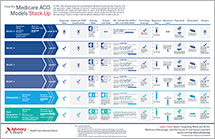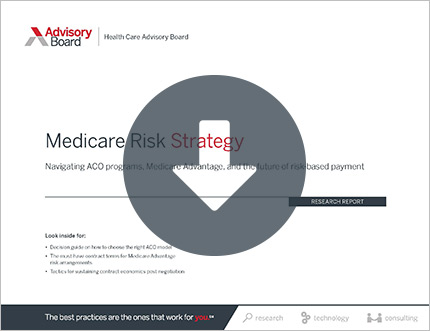Auto logout in seconds.
Continue LogoutChange is afoot in the world of ACOs. At the end of 2018, CMS proposed an overhaul of the current Medicare Shared Savings Program (MSSP), which underscores their intention to accelerate ACOs' transition towards downside risk. Now, current MSSP participants are evaluating whether they are ready to take on more financial accountability for cost and quality outcomes or whether they're better off exiting the program. And those that are ready may even double down on the model by expanding into more commercial markets.
While anyone would agree that providers' decision to stay or leave MSSP should be based on a multitude of factors (e.g., existing management infrastructure, system margin performance), it's important to not overlook the legal implications of that decision, particularly with regard to clinical integration and antitrust compliance. To learn more about what that might entail, we connected with John Steren of Epstein Becker Green who provided his take on the decision that providers face and offered some key points to keep in mind moving forward.
Question: Before we get into strategy, I want to set the stage. How do ACOs currently fit into the antitrust regulatory landscape?
John Steren: In describing how an ACO fits into the antitrust regulatory landscape, and the significance, from an antitrust perspective of an ACO's participation in the MSSP, it may be best to start by describing what a clinically integrated network (CIN) is, and the benefits of clinical integration.
A CIN is a moniker placed on a network of independent providers (including physicians and hospitals) that join together for the primary purpose of improving care and reducing costs through clinical integration. Providers in a network are deemed to be clinically integrated if they implement a program to modify practice patterns and create interdependence among the providers to control cost and ensure quality. A successful clinical integration program consists of many elements including: (1) protocols to monitor and control utilization; (2) selectively choosing network participants and assuring adherence to established protocols through education, and if necessary termination for non-compliance; and (3) investment by the network participants of both human and financial capital in the network.
Significantly, if these independent providers are deemed to be clinically integrated, they can undertake certain joint actions, including jointly negotiating payer contracts on behalf of the network, without concern that their joint conduct will be deemed unlawful per se under the antitrust laws.
ACOs and CINs are related, but not synonymous, terms. The ACO is a creature of the Affordable Care Act designed to serve a patient population under the MSSP. ACOs, like CINs, are networks comprised of independent providers. However, while an ACO was intended to improve quality and control cost, many ACOs have not implemented all of the required elements to achieve clinical integration. Nevertheless, because of the similarities between CMS' eligibility criteria and the enforcement agencies definition of clinical integration, and CMS' monitoring of ACO results, the federal enforcement agencies have indicated that they will treat all ACOs that participate in MSSP as clinically integrated.
Q: So if an MSSP ACO exits the program, what impact will that have on their existing contracts?
JS: Right now, MSSP ACOs are able to use their presumption of clinical integration to negotiate with commercial payers, so long as they rely on the same governance and leadership structures and clinical and administrative processes as they use for MSSP. If the ACO leaves MSSP, it will need to first assess whether it remains clinically integrated without reliance on the presumption of clinical integration afforded through participation in MSSP. And if not, the ACO will need to either establish clinical integration; implement some other form of integration (such as financial risk sharing); or stop jointly negotiating contracts. Otherwise, the ACO risks significant antitrust exposure.
Q: What are the key differences between an MSSP ACO and a Federal Trade Commission (FTC)/ Department of Justice (DOJ)-approved CIN?
JS: For starters, the concept of clinical integration is based, in part, on the coordination of care and interdependence among providers to increase quality and reduce cost. This typically includes such things as the sharing of information among provides, e.g., through a common EHR, as well as policies and procedures for altering referral patterns to assure that patients stay in-network to help with the continuity of care. While ACOs typically require providers to share information with the ACO, they don't necessarily require the sharing of information among providers. By the same token, while ACOs are required to establish protocols for the continuity of care, these don't necessarily entail the same degree of interdependence and referral related protocols that would generally be expected of a CIN.
In addition, the FTC Advisory Opinions and the Statements of Enforcement Policy in Health Care by and large address integration among physicians. The larger ACOs may include multiple independent hospitals and other non-physician providers which are deemed to be clinically integrated by virtue of their participation in the MSSP, but will present some unique issues if the ACO departs the program.
Q: If an MSSP ACO wants to move into the commercial world, what are the considerations to keep in mind for commercial contracting?
JS: As previously noted, in order for the ACO to move into the commercial world, it needs to rely on the same governance and leadership structures and clinical and administrative processes as it uses for MSSP. Otherwise, they would fall outside of the protection afforded by the ACO Policy Statement. In addition, it may face some unique challenges in 1) developing a fee schedule; and 2) sharing of information across the network.
Q: What advice do you have for providers who are considering their status in MSSP – should integration status be a factor in their decision to stay or leave the program?
JS: I don't think that the threat of losing CIN status should singlehanded drive providers ACO strategy. CMS' new regulations put significant financial pressure on ACOs to deliver improved cost and quality outcomes and the benefits of joint contracting may not be enough to outweigh that. That said, it's crucial that providers acknowledge the repercussions of their decision to stay or leave the program, even if only from the perspective of legal due diligence.
Just updated: Your cheat sheets for understanding health care's legal landscape
To help you keep up with the ever-changing regulatory environment, we recently updated our cheat sheets on some of the most important—and complicated—legal landmarks to include a brand new one-pager on the new tax law.
Check out the cheat sheets now for everything you need to know about MACRA, the Affordable Care Act, antitrust laws, fraud and abuse prevention measures, HIPAA, and the two-midnight rule.
Don't miss out on the latest Advisory Board insights
Create your free account to access 1 resource, including the latest research and webinars.
Want access without creating an account?
You have 1 free members-only resource remaining this month.
1 free members-only resources remaining
1 free members-only resources remaining
You've reached your limit of free insights
Become a member to access all of Advisory Board's resources, events, and experts
Never miss out on the latest innovative health care content tailored to you.
Benefits include:
You've reached your limit of free insights
Become a member to access all of Advisory Board's resources, events, and experts
Never miss out on the latest innovative health care content tailored to you.
Benefits include:
This content is available through your Curated Research partnership with Advisory Board. Click on ‘view this resource’ to read the full piece
Email ask@advisory.com to learn more
Click on ‘Become a Member’ to learn about the benefits of a Full-Access partnership with Advisory Board
Never miss out on the latest innovative health care content tailored to you.
Benefits Include:
This is for members only. Learn more.
Click on ‘Become a Member’ to learn about the benefits of a Full-Access partnership with Advisory Board
Never miss out on the latest innovative health care content tailored to you.


